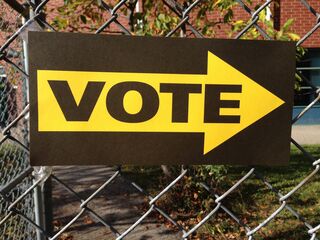Resilience
Coping With Election Angst and Distress
How to face election hypersensitivity.
Posted November 3, 2022 Reviewed by Jessica Schrader
Key points
- There is meaning to be found in each stage of the election process.
- Expect both existential angst and emotional distress when participating in electoral politics.
- Even the best of intentions can sometimes backfire if we are obsessed with or fixated on the outcome.

As someone with longstanding experience in the management of election campaigns,1 I’ve noticed a significant shift in how constituents perceive and, importantly, how they respond to, the electoral process.
Both voters and nonvoters are increasingly suspicious of what they see—or think they see—happening in the political arena, making the perception of election integrity a formidable challenge. The lack of transparency of what takes place before an election, what happens when ballots are cast, and what occurs afterwards when votes are tallied wreak havoc on public trust and confidence in the electoral process. All this can be fodder for triggering existential angst and/or emotional distress.
On a global scale, we appear to be living in an age of extreme political polarization and ideological discord. Recent political realignments and partisan conflicts worldwide only serve to exacerbate an already tense election landscape. Leading up to the midterm elections in the U.S., there have been numerous reports of not only verbal abuse but also threats and acts of violence against candidates and their supporters. To be sure, such actions are unacceptable in a civil society.
Heightened tensions, of course, don’t just happen during the pre-election phase of this process; they can also be observed during the tabulation of voting results as well as during the post-election period, especially if your preferred candidate(s) is/are not elected. Compounded by feelings of political inefficacy (“my vote doesn’t count”; “the election has been stolen”), citizens can also become politically alienated and, as a result, more apathetic, frustrated, or angry with their government and public officials.
Elections provide us with important opportunities to learn and grow from our experience, as well as to discover meaning through the lens of politics, as long as we assume personal and collective responsibility for the integrity of both the process and results. Without such responsibility, there can be no democracy, no real freedom.
Regardless of the type of election involved, there will always be winners and losers. Being on the losing side of an election need not create distrust in the electoral system, nor should it lead to giving up hope on the inherent value of democracy and the aspirational values upon which democratic political systems are based. Accepting loss is part of life, part of recognizing what you can control and what you can’t.
Drawing upon insights from existential philosophy and humanistic psychology, there are strategies that can be used in response to any pre-/during/post-election distress, anxiety, or even depression that may ensue.
The wisdom of the world-renowned psychiatrist, existential philosopher, and Holocaust survivor, Viktor E. Frankl, M.D., Ph.D., author of the classic bestseller Man’s Search for Meaning, can shine some light on this matter from a uniquely meaning-centric perspective.2 With his System of Logotherapy and Existential Analysis, Dr. Frankl offers guidance to advance the human quest for meaning in everyday life and work, including situations that may be unavoidable.
Among the most well-known tenets of Dr. Frankl’s humanistic approach is the notion of freedom of will: “Everything can be taken from a man but… the last of the human freedoms—to choose one’s attitude in any given set of circumstances, to choose one’s way.” In all situations, no matter how desperate or challenging they may appear or actually be, we always have the ultimate freedom to choose our attitude.
Some individuals cope more easily than others with changes in circumstances, including times of disappointment, such as losing an election. As Frankl wisely advised, when we are no longer able to change a situation, we are challenged to change ourselves.
Frankl’s meaning-centric approach includes a number of core principles that are described in some detail in our book, Prisoners of Our Thoughts.3 I’ve already introduced one of them, “Exercise the freedom to choose your attitude.” Here are other principles that can offer guidance when coping with the stresses resulting from the outcomes of the electoral process.
Detect the meaning of life’s moments. Observing and participating in political campaigns provide many opportunities for personal reflection. If done authentically, the exercise can help you discover deeper meaning in your experience, as well as increase your level of resilience and coping skills when dealing with stressful situations like those found during the election process.
Don’t work against yourself. Avoid becoming so fixated on an intent or outcome that you actually work against the desired result. In the political arena, a fixation on or obsession with a particular candidate for elected office can actually work against us, albeit subconsciously, if we are not mindful of our attitude and actions.
Look at yourself from a distance. Since only human beings possess the capacity to look at themselves from a distance, you have the resilience-building option of viewing the situation at hand with a sense of perspective, even with a sense of humor, in order to ensure that you don’t become imprisoned by your thoughts and allow the situation to effectively crush your spirit.
Shift your focus of attention. To find the deeper meaning of any given problem or life challenge, deflect your attention from the situation at hand to something else, preferably to something positive, in order to build your coping mechanisms for dealing with stress and change. Limiting exposure to political news can help you focus on healthy living and restore your energy. Give yourself breaks from the news, especially politics, and limit your time on social media, which can intensify anxiety and depression, if you are unable to disconnect completely.
Every election can trigger existential angst and mental distress for some people, especially in response to electoral loss. To make matters worse, post-election emotional responses, both positive and negative, are intensified in a climate of contentious political divide and strife. It is my hope that some of the strategies presented in this short post can help you reflect upon how you might more effectively cope with and address your election emotional response.
References
1. This experience includes being a campaign management trainer and consultant with candidates for local, state/provincial, and national public office in collaboration with my long-time mentor, colleague, and dear friend, the late Professor Robert Agranoff, Ph.D., author of the classic text, The Management of Election Campaigns, 1976.
2. See: Frankl, V. E. (1992). Man’s Search for Meaning: An Introduction to Logotherapy, 4th ed. Boston: Beacon.
3. Pattakos, A., and Dundon, E. (2017). Prisoners of Our Thoughts: Viktor Frankl’s Principles for Discovering Meaning in Life and Work, 3rd. ed. Oakland: Berrett-Koehler.




